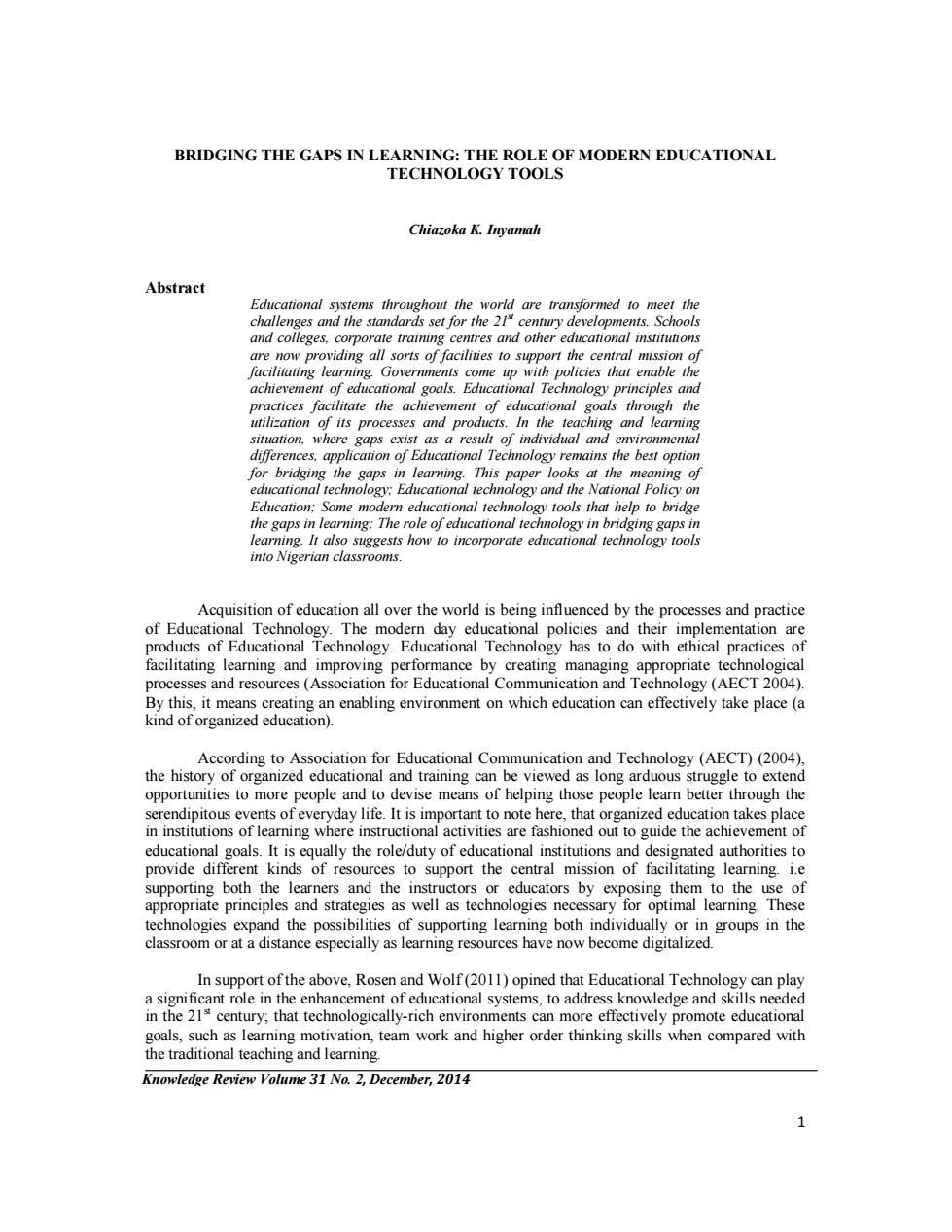正在加载图片...

BRIDGING THE GAPS IN LEARNING:THE ROLE OF MODERN EDUCATIONAL TECHNOLOGY TOOLS Chiazoka K.Inyamah Abstract Educational systems throughout the world are transformed to meet the challenges and the standards set for the 21 century developments.Schools and colleges,corporate training centres and other educational institutions are now providing all sorts of facilities to support the central mission of facilitating learning.Governments come up with policies that enable the achievement of educational goals.Educational Technology principles and practices facilitate the achievement of educational goals through the utilication of its processes and products.In the teaching and learning situation.where gaps exist as a result of individual and environmental differences.application of Educational Technology remains the best option for bridging the gaps in learning.This paper looks at the meaning of educational technology:Educational technology and the National Policy on Education;Some modern educational technology tools that help to bridge the gaps in learning:The role of educational technology in bridging gaps in learning.It also suggests how to incorporate educational technology tools into Nigerian classrooms. Acquisition of education all over the world is being influenced by the processes and practice of Educational Technology.The modern day educational policies and their implementation are products of Educational Technology.Educational Technology has to do with ethical practices of facilitating learning and improving performance by creating managing appropriate technological processes and resources(Association for Educational Communication and Technology(AECT 2004). By this,it means creating an enabling environment on which education can effectively take place (a kind of organized education). According to Association for Educational Communication and Technology (AECT)(2004), the history of organized educational and training can be viewed as long arduous struggle to extend opportunities to more people and to devise means of helping those people learn better through the serendipitous events of everyday life.It is important to note here,that organized education takes place in institutions of learning where instructional activities are fashioned out to guide the achievement of educational goals.It is equally the role/duty of educational institutions and designated authorities to provide different kinds of resources to support the central mission of facilitating learning.i.e supporting both the learners and the instructors or educators by exposing them to the use of appropriate principles and strategies as well as technologies necessary for optimal learning.These technologies expand the possibilities of supporting learning both individually or in groups in the classroom or at a distance especially as learning resources have now become digitalized. In support of the above,Rosen and Wolf(2011)opined that Educational Technology can play a significant role in the enhancement of educational systems,to address knowledge and skills needed in the 21s century;that technologically-rich environments can more effectively promote educational goals,such as learning motivation,team work and higher order thinking skills when compared with the traditional teaching and learning. Knowledge Review Volume 31 No.2,December,2014 11 BRIDGING THE GAPS IN LEARNING: THE ROLE OF MODERN EDUCATIONAL TECHNOLOGY TOOLS Chiazoka K. Inyamah Abstract Educational systems throughout the world are transformed to meet the challenges and the standards set for the 21st century developments. Schools and colleges, corporate training centres and other educational institutions are now providing all sorts of facilities to support the central mission of facilitating learning. Governments come up with policies that enable the achievement of educational goals. Educational Technology principles and practices facilitate the achievement of educational goals through the utilization of its processes and products. In the teaching and learning situation, where gaps exist as a result of individual and environmental differences, application of Educational Technology remains the best option for bridging the gaps in learning. This paper looks at the meaning of educational technology; Educational technology and the National Policy on Education; Some modern educational technology tools that help to bridge the gaps in learning; The role of educational technology in bridging gaps in learning. It also suggests how to incorporate educational technology tools into Nigerian classrooms. Acquisition of education all over the world is being influenced by the processes and practice of Educational Technology. The modern day educational policies and their implementation are products of Educational Technology. Educational Technology has to do with ethical practices of facilitating learning and improving performance by creating managing appropriate technological processes and resources (Association for Educational Communication and Technology (AECT 2004). By this, it means creating an enabling environment on which education can effectively take place (a kind of organized education). According to Association for Educational Communication and Technology (AECT) (2004), the history of organized educational and training can be viewed as long arduous struggle to extend opportunities to more people and to devise means of helping those people learn better through the serendipitous events of everyday life. It is important to note here, that organized education takes place in institutions of learning where instructional activities are fashioned out to guide the achievement of educational goals. It is equally the role/duty of educational institutions and designated authorities to provide different kinds of resources to support the central mission of facilitating learning. i.e supporting both the learners and the instructors or educators by exposing them to the use of appropriate principles and strategies as well as technologies necessary for optimal learning. These technologies expand the possibilities of supporting learning both individually or in groups in the classroom or at a distance especially as learning resources have now become digitalized. In support of the above, Rosen and Wolf (2011) opined that Educational Technology can play a significant role in the enhancement of educational systems, to address knowledge and skills needed in the 21st century; that technologically-rich environments can more effectively promote educational goals, such as learning motivation, team work and higher order thinking skills when compared with the traditional teaching and learning. Knowledge Review Volume 31 No. 2, December, 2014